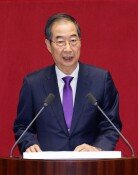Korea is second to last in oil security
Korea is second to last in oil security
Posted December. 13, 2013 05:56,
According to the analysis by the Korea Energy Economics Institute, Korea was found to be the second most vulnerable nation in terms of oil security.
The research institute assessed that among the 32 major nations whose oil consumption exceeds oil imports by over 100,000 barrels, Korea came in second with 0.745 in the oil security vulnerability, following Thailand with 0.847. Taiwan came in third with 0.744, China 17th with 0.493 and Japan 19th with 0.483. As the figure comes closer to one (1), a nations industry is more dependent on oil and its economy is more likely to be affected by the vulnerable supply and demand in the global oil market.
○ Korea takes a step backward
Compared to the year of 2000, Koreas vulnerability was lowered only by 0.042 points largely because its industrys dependence on oil increased from 0.879 (seventh) in 2000 to 1.278 (fourth) in 2010. In addition, Korea ranked third in the oil consumption against GDP. A high proportion of primary energy sources including oil in the energy mix has also contributed to the nations high vulnerability in oil security. Koreas consumption of primary energy in 2010 increased 30.8 percent from 2000. The only good news is that the nations private sector succeeded in diversifying its oil suppliers to over 20 nations, contributing to the improvement of its oil security. In the supply sector, Koreas vulnerability ranking dropped from eighth in 2000 to 22nd in 2010.
An official from the research institute on energy said, Nations more vulnerable than Korea were only those going through rapid economic growth, such as China, Thailand, Brazil, India, Turkey and Taiwan, adding, (Koreas high consumption of oil) is in contrast with advanced nations whose oil consumption started declining from the mid 2000s.
○ Korea needs to expand oil suppliers while strengthening control of oil demands
Lee Dal-seok, the head of Energy Information Statistics Center at the Korea Energy Economics Institute, said, As the development of new and renewable energy is relatively slow and the development of materials to replace naphtha, a product from petroleum, is still at an insignificant level, Korea is highly dependent on oil, adding, (Korea) should continuously focus on the oil demand control, such as strengthening the standards of energy efficiency.
As the production of oil and gas from unconventional deposits such as oil sand and shale gas is rapidly increasing, the order of the global energy market is being reshaped. The institute advised that Korea should take advantage of such a shift strategically. Lee said that Korea should consider importing oil from Russia who tries to expand its oil export in East Asia and Canada whose oil output is on the rapid rise thanks to the development of shale gas and oil sand.







